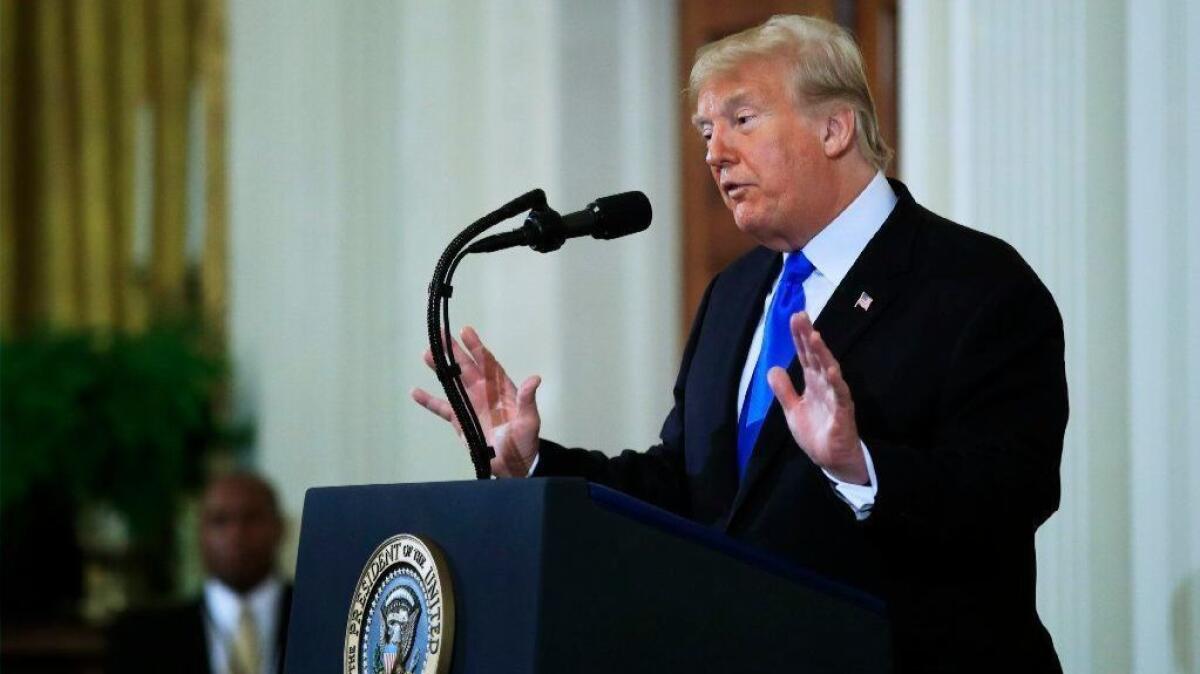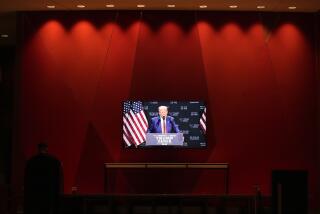Trump turns his post-election reckoning into an operatic performance of grievances and pugilism

Reporting from Washington — President George W. Bush would blow off steam by clearing brush from his ranch. President Obama would sneak a soupcon of almonds or a cigarette. President Trump’s happy place: duking it out with a roomful of pestering reporters.
Trump turned his post-election news conference on Wednesday — normally an occasion for presidents to lick wounds and move on after midterm losses — into a nearly 90-minute political tour de force for the president who loves as much as anything to put on a pugilistic performance.
He took no blame for the type of humbling losses that Bush called a “thumpin’ ” in 2006 or Obama acknowledged as a “shellacking” in 2010, when they similarly presided over their party’s loss of at least one house of Congress.
Instead, Trump hailed “a great victory,” against the electoral evidence otherwise. Then, after dutifully reading off most of the 10 pages of prepared notes from beneath the sparkling chandeliers in the White House East Room, he gleefully began brawling and blaming his enemies — rather, “enemies of the people,” as he again labeled reporters, one in particular.
The president told a black reporter, who asked whether his calling himself a “nationalist” was emboldening white nationalists, that she was asking “a racist question.” He taunted Republican House members who lost their seats after refusing his “embrace,” saying, “Too bad. Sorry about that.” He mocked Japanese Prime Minister Shinzo Abe, a close ally, with an aside to a Japanese reporter, “Say hello to Shinzo. I’m sure he’s happy about tariffs on his cars.”
Above all, Trump suggested that his primary opponent for the next two years will not be Democratic House leader Nancy Pelosi of San Francisco — for whom he had nothing but kind words — or any other Democrats angling for their party’s 2020 presidential nomination, or even the special counsel’s office that is investigating him, his company and his 2016 campaign. Instead, Trump showed he’s running against the news media. And some reporters played willing foils by interrupting the president, shouting and refusing to yield the floor.
“I tell you what, CNN should be ashamed of itself having you working for them,” Trump told CNN’s Jim Acosta, after the correspondent refused to defer to another reporter or hand the microphone to a White House intern tasked by Trump to take it from him. “You are a rude, terrible person,” he further admonished Acosta. “You shouldn’t be working for CNN.”
When the waiting reporter, NBC’s Peter Alexander, defended Acosta for his diligence as a reporter, Trump pounced on Alexander. “Well, I’m not a big fan of yours, either, so you know.”
And on they went, back and forth.
Trump told three reporters with foreign accents that he could not understand them, even as he fended off questions about whether his campaign rhetoric had been xenophobic. He barked “Sit down!” six times to reporters. “Quiet, quiet, quiet,” he told another, raising his voice.
As he fought with questioners, he just as often avoided answering their questions. NBC’s Kristen Welker asked Trump twice about the rise of anti-Semitic attacks and hate crimes since his election. The first time, Trump replied with an extended boast about his relations with Israel. The second time, he went on a tangent about trade and Chinese President Xi Jinping.
“I think I am a great moral leader and I love our country,” Trump said finally, offering no elaboration, after she pressed a third time.
Current and former aides say he is often motivated by genuine anger, rather than strategy, in such confrontations. A bit of both was on display. As vexed as he appeared at moments, the president by his performance distracted from the news of Republicans’ loss of control of the House, which was both a rebuke of Trump given his centrality to the election and a development that introduced a significant check on his presidency.
Beyond that, the sparring with reporters served as a message to Trump’s base, that he will not stop fighting. While critics saw a petulant, un-presidential performance, many in Trump’s thrall saw a ravenous and disrespectful media always out to get the president.
When Acosta protested that CNN employees had been targeted by the recent mailing of pipe bombs, allegedly by a Trump supporter, after such rhetoric, the president showed no sense of responsibility, let alone remorse.
“When you report fake news — which CNN does a lot — you are the enemy of the people,” Trump said.
Hours later the White House, in a rare move, said that it was suspending Acosta’s press credential, falsely claiming he physically mistreated the female intern who tried to take his microphone as he persisted in questioning Trump.

President Trump spars with CNN’s Jim Acosta at a White House news conference.
MORE: White House suspends press pass of CNN’s Jim Acosta after heated exchange with Trump »
Former Florida Gov. Jeb Bush, a rival for the 2016 Republican presidential nomination, was among the most prominent critics after Trump’s news conference, tweeting his endorsement of the important role of a free press in a constitutional democracy. If Trump notices, he would likely greet such criticism from an establishment Republican as a gift, and take a swipe on Twitter, demeaning Bush as he did to crushing effect during the Republican primary debates.
While reporters were Trump’s primary targets in the East Room, they were not the only ones. The president went out of his way to lambaste fellow Republicans who had kept their distance or even criticized him during their campaigns, given his unpopularity in their districts or states.
“You had some that decided to, ‘Let’s stay away. Let’s stay away,’ ” Trump said, shaking his head. “They did very poorly.”
“I’m not sure that I should be happy or sad, but I feel just fine about it,” he continued, before reeling off the names of vanquished Republicans from Florida, Colorado, Minnesota, Virginia, Illinois, New York, New Jersey and Utah.
“Carlos Curbelo, Mike Coffman — too bad, Mike,” he said, looking to the side as if addressing the Colorado congressman. Referring to a Utah congresswoman, he said, “Mia Love gave me no love and she lost. Too bad, Mia.”
For some Republicans still feeling the pain of the party’s defeats, it was too much from a president whose low popularity among minority, suburban and female voters propelled their losses. Among them was Rep. Ryan Costello, who chose retirement rather than facing reelection in a redrawn Pennsylvania district that was captured by a Democrat on Tuesday.
He tweeted resentfully during the news conference about dealing with “harassment and filth spewed at” Republican members of Congress “in tough seats every day for 2 yrs” because of Trump. He wrote that most of these lawmakers chose to bite their lips most of the time, even as Trump’s incivility further dimmed their political futures.
To lose because of Trump and “have him piss on u,” Costello continued, “Angers me to my core.”
Others responded to Trump’s grave-dancing with a bit of gallows humor, hitting back at the president who’s given new meaning to bully pulpit.
Among them was Josh Penry, Coffman’s strategist for the congressman’s unsuccessful bid for reelection from a suburban Denver district. “If he would have attacked us from the White House podium 72 hours ago,” Penry said of Trump, “we might have won the damn thing.”
Times staff writer Eli Stokols contributed to this report.
Follow the latest news of the Trump administration on Essential Washington »
Twitter: @noahbierman
UPDATES:
5:30 p.m.: This article was updated with White House action to suspend press credentials of CNN’s Jim Acosta.
This article was originally published at 4:35 p.m.
More to Read
Get the L.A. Times Politics newsletter
Deeply reported insights into legislation, politics and policy from Sacramento, Washington and beyond. In your inbox three times per week.
You may occasionally receive promotional content from the Los Angeles Times.











